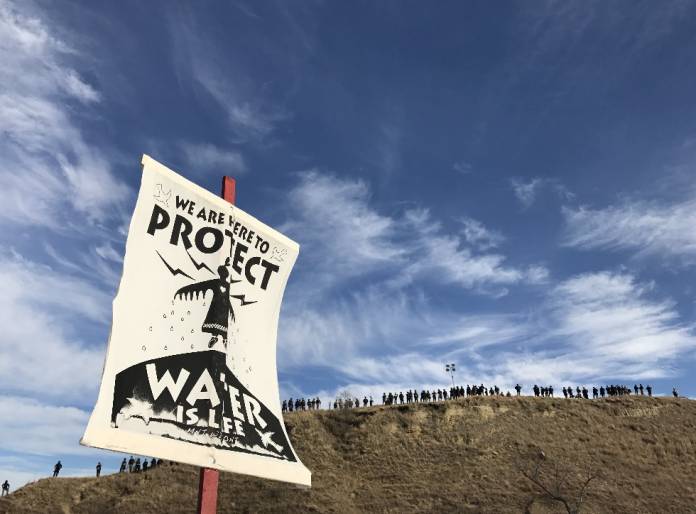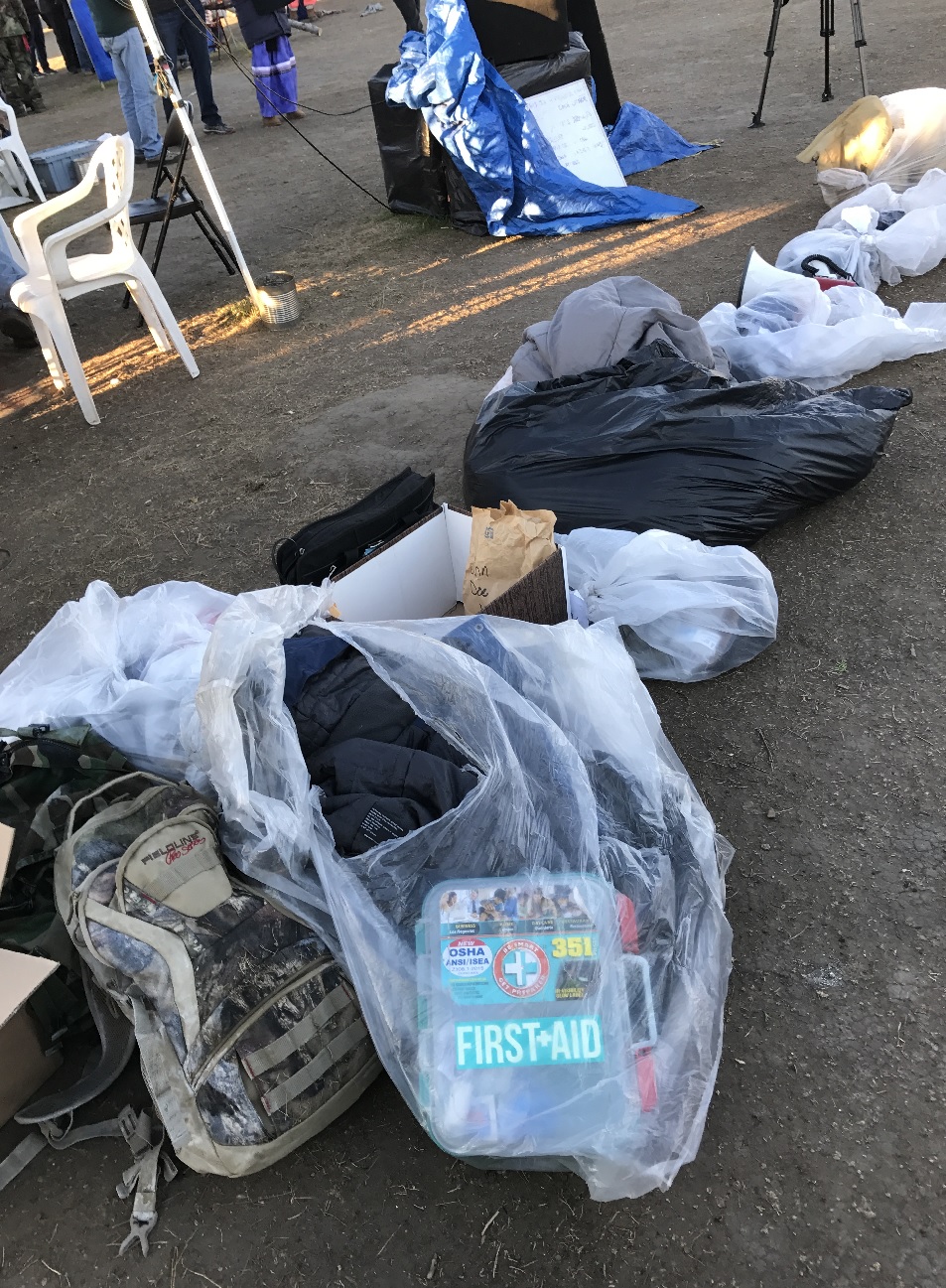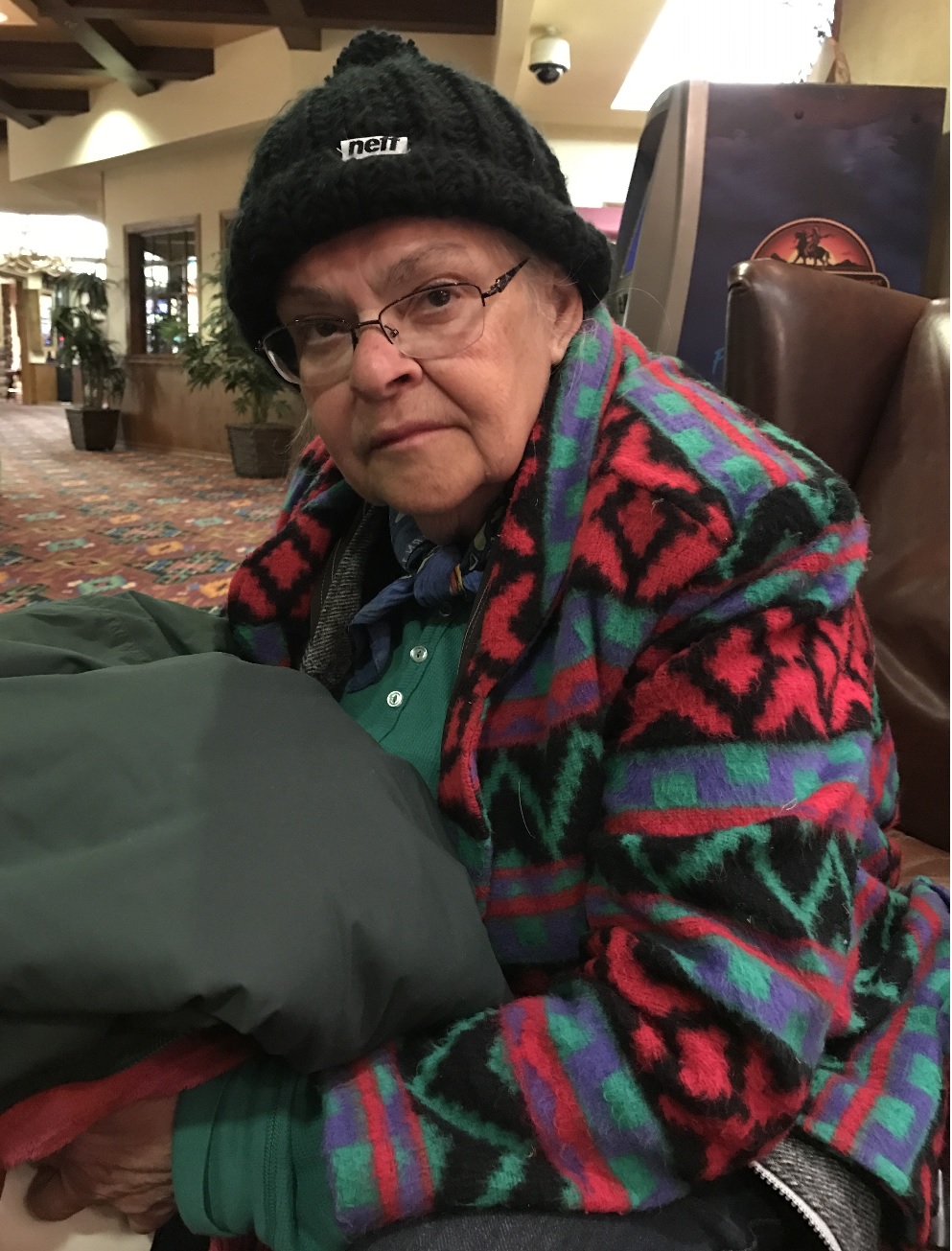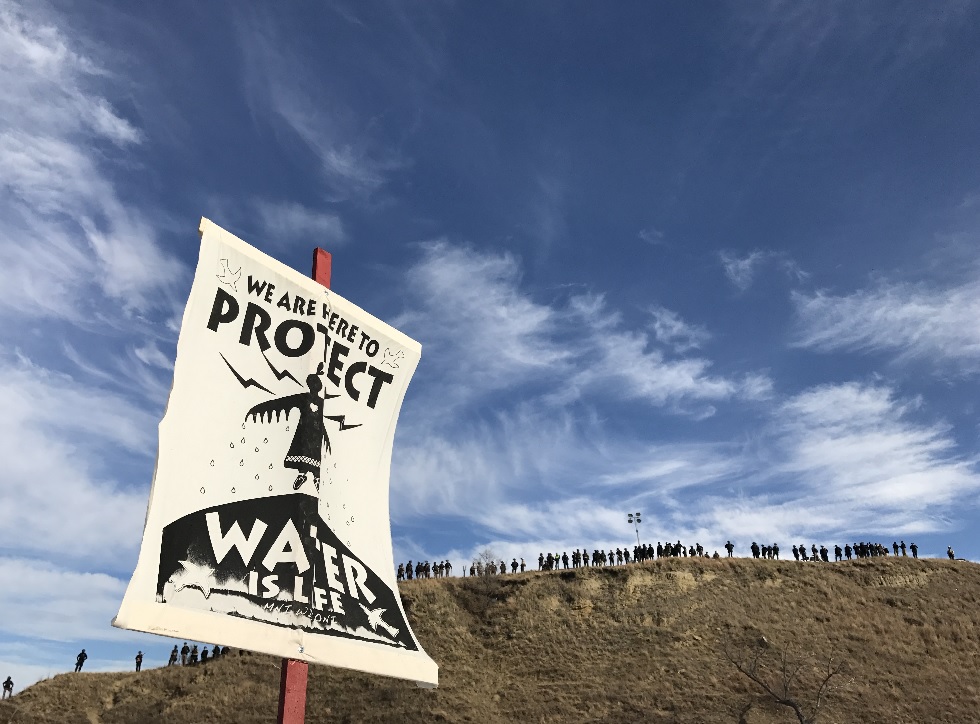
October 29
Two days ago, more than 300 police from five states violently cracked down on a newly formed frontline camp that was set up in the direct path of the $3.8 billion Dakota Access Oil Pipeline. More than 100 people were arrested and charged with felonies.
David Yelloweyes quit his job in Portland, Oregon two weeks ago to join the growing movement here at Standing Rock. On Thursday, he was arrested, numbered on his arm, and strip searched.
“I’ve never made a stand in my life,” he says. “My children drink water. I love my kids dearly. People were talking on Facebook, saying, ‘Do it for your family. We need you.’ I want my kids to know that I was here. I stood on Standing Rock, on my grandma’s reservation, and I took action. When we win and we will win, I want to be able to be part of that history and my kids can look at me and say, ‘We’re proud of my dad.'”
When Yelloweyes was arrested on the front line, he said he “was praying to them (the police). I said, ‘I come to you guys in peace. I have no weapons, but my mouth. I’m a man of prayer and I just want to pray for you.’ All I did was pray for them to let them understand our battle. It’s not just for Natives. It’s for everyone who drinks water.”
Joe Heath, a lawyer from New York who is at Standing Rock to support the water protectors, says the National Lawyers Guild, which has a legal tent here, is in dire need of lawyers to offer representation.
So far, 416 people have been arrested. Approximately 150 people have been charged with felonies. Many have also been strip searched and forced to squat and cough. Bail has been as high as $1,500. Those who can’t post bail right away have no choice but spend several nights behind bars.
“We now have to put together a mass defense,” says Heath. “Hopefully the progressive legal movement can come and support these people. We need lawyers here. We need people to help us show that these charges are shams. They’re just making stuff up so they can sweep people away, lock them up, and intimidate people.”
Help us save local journalism!
Every tax-deductible donation helps us grow to cover the issues that mean the most to our community. Become a 48 Hills Hero and support the only daily progressive news source in the Bay Area.
Heath represented inmates during the Attica Prison uprising in 1971. Since then, he has been involved in dozens of similar cases involving mass movements. I asked him to tell me what’s unique about the arrests and militant response we’ve seen here at Standing Rock.
“There are a couple of things that are unique here. The level of military violence we saw on Thursday is off the chart and shameful. What we see here is a manifestation of what you get to know when you work in Indian Country. It’s still okay to be racist against Indians.”

Many of the more than 100 water protectors who were arrested on Thursday, October 27, had their cars impounded and their personal belongings confiscated. A few of those things were returned in plastic bags to the camp today, followed by a cleansing ceremony. Lawyers who are taking oral testimonies say elders have been traumatized after sacred items like feathers and pipes were taken.
A women’s healing tent has been erected for those who’ve lost all of their belongings. A few women were released after three nights in jail and returned to camp with nothing, not even their cell phones. One woman told me she was allowed to call her family just once over the course of three days in jail. She received a felony charge and was forced to give a DNA sample.
Human rights observers are here to find out exactly what happened that day.
According to the Indigenous Environmental Network: More than 300 police officers in riot gear from five states arrived with eight ATVs, five armored vehicles, two helicopters, and numerous military-grade humvees. Pepper spray, percussion grenades, and shotguns were fired into the crowd. A sound cannon was also used. At least one person was tased and the barbed hook lodged in his face, just below his eye. Another was hit in the face by a rubber bullet. A prayer circle of elders, including several women, was interrupted and all were arrested for standing peacefully on the public road.
November 2, 2016

I was supposed to fly back to San Francisco from Standing Rock tonight, but there are too many important stories to tell, so I’ve decided to extend my trip.
This morning, I met and interviewed Carol Masden, a 69-year-old Native woman who’s been camping here for three weeks. The trip from her home in Vicksburg, Pennsylvania, took three days by bus. She was arrested on the front lines and spent three days in jail, including three hours in solitary for fist bumping someone. Three hours for fist bumping! She spent three days in a cold jail cell for sitting in a prayer circle.
She now has pneumonia and is still waiting for her ID and Medicare card, which she needs in order to get her medication. Last night was her first night in a hotel. When I suggested she stay another night and rest, she said, “I have to get back to camp. What if there’s another action?”
Masden has been charged with a felony and has to stay here until at least December 5 to make a court appearance. She also said a DNA sample was taken. I’m hearing this from several people who’ve been arrested.
On the way to Bismarck to host my radio show Your Call this morning, a truck was pulling away after dumping out personal belongings from front line camps, including feathers, pipes, and other sacred items. These items were confiscated during Thursday’s violent crackdown. When I stopped, people were hugging and crying.
“Some of this stuff has been given to people by their grandparents,” said Stuart Americanhorse, a Lakota is from the Standing Rock Sioux reservation. “These are people’s things and this is how they were treated. How do you come to grips with this?”
These outrageous and inspiring stories need to be told.
November 5, 2016
Today was a beautiful day filled with so much activity. It feels like summer in Northern California. This time last year, North Dakotans were wearing snow shoes.
The camp feels like it has doubled in size since I was here last month. There are lines of cars arriving and water protectors are working non-stop to winterize the camp.
Young runners from the Navajo Nation in Arizona arrived today. There was also an historic prayer ceremony and an emotional welcoming for Veterans for Peace.
This family wanted to join the movement, but couldn’t get time off of work to stay for longer than one day. After a 13-hour drive from Manitoba, they spent the day here, and have already hit the road to return home!
I met them as they were putting up their red flag: Treaty 4 #282 Pine Creek First Nation.
I also met a couple from Colorado who drove 11 hours to drop off a carload of food. They had to head back after three hours in camp. They could have sent money, but they wanted to be here even for a few hours.
“This is about so much more than the pipeline.” That was the day’s overall sentiment.
November 6, 2016

This afternoon at Standing Rock, water protectors gathered at a sacred site where tribal elders say their ancestors are buried. They were met by a militarized police force and tear gas canisters. A few young women were shaken up after being tear gassed, but no one was seriously hurt.
A number of Native elders I met, including Bertina LaBatte, a member of the Standing Rock tribe, could barely speak. For many, this is the first time they’ve seen a militarized police force up close. “We came to pray and this is their response?”
“Where are we living? This is not America,” said LaDonna Bravebull Allard, the owner of the northernmost land of the Standing Rock Reservation.
“They are violating the Constitution. They are violating traditional law. Since when did a corporation have more say than the people? Where are we?”
Sandra Rambler, an Apache from Arizona, arrived at Standing Rock this morning after a four-day journey. During the action, she grabbed a megaphone to send a message to the police. She then told me, “My job is to help protect the water. I wanted to be part of this history. This is history in the making.”

